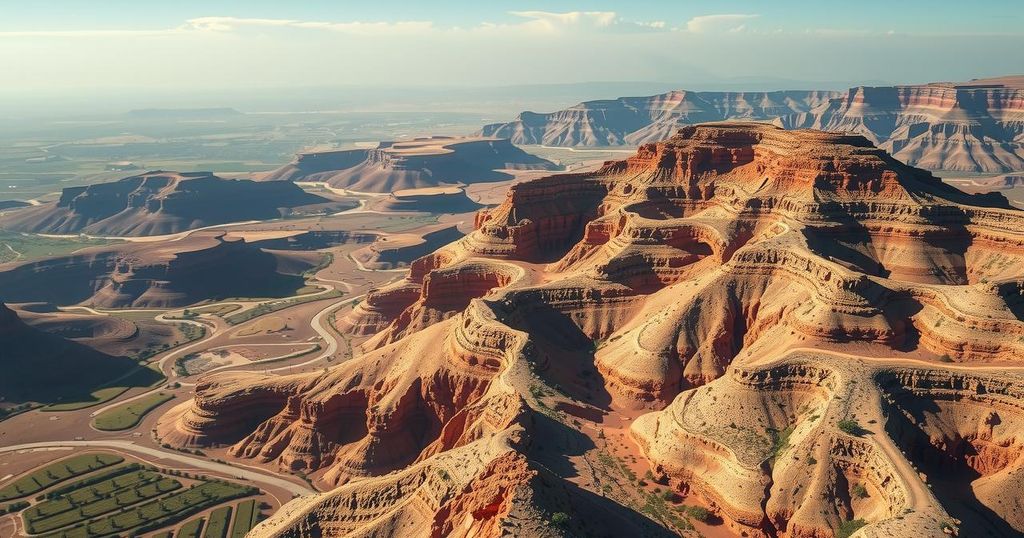World news
ABD, ABDELKARIM EL AMIN, AFAR, AFRICA, AID OPERATIONS, CLIMATE, CLIMATE CHANGE, DA, DABANGA, DABANGA – RADIO TV ONLINE, DISASTER MANAGEMENT, EGYPT, EL AMIN, EMERGENCY RESPONSE COORDINATION CENTRE, EUROPEAN CIVIL PROTECTION AND, EUROPEAN CIVIL PROTECTION AND HUMANITARIAN AID OPERATIONS –, FLOODING, GFZ, GFZ HELMHOLTZ CENTRE FOR GEOSCIENCES, GRAND ETHIOPIAN RENAISSANCE DAM, NATURAL DISASTERS, RADIO TV, SUDAN, US GEOLOGICAL SURVEY
Oliver Grayson
0 Comments
Ethiopia Earthquakes: Sudanese Experts Address Concerns for GERD and Sudan
Recent earthquakes in Ethiopia’s Afar region have prompted the evacuation of thousands, yet Sudanese experts downplay risks to the Grand Ethiopian Renaissance Dam (GERD), emphasizing its distance from seismic activity. Engineer Abdelkarim El Amin reassures that the dam is built to withstand seismic events, although he notes potential environmental issues requiring further scientific investigation.
Recent seismic activity in the Afar region of northwest Ethiopia has led to the evacuation of over 80,000 individuals due to a series of earthquakes and aftershocks, the most significant being an 8.1 magnitude quake confirmed to have occurred east of Addis Ababa. Despite the unrest, Sudanese geoscientists have sought to mitigate fears regarding the potential impact of these earthquakes on the Grand Ethiopian Renaissance Dam (GERD), asserting that the seismic activity is occurring well over 100 kilometers away from the dam’s site.
Engineer Abdelkarim El Amin, a Sudanese expert in surveying and earth sciences, emphasized that the GERD was constructed with seismic resilience in mind, noting that it is situated approximately 500 kilometers from the epicenter of the recent earthquakes. Although he acknowledged concerns of a decrease in water levels in the reservoir, suggesting a possible leak, he dismissed any immediate threat to the dam’s structural integrity due to the seismic events. El Amin stated, “the area where the GERD is built is far from the earthquake zone in eastern Ethiopia.”
El Amin further highlighted the importance of rigorous geological studies conducted prior to the dam’s construction, which ensured its capability to withstand earthquakes. Despite his confidence in the GERD’s design, he outlined a worst-case scenario wherein a partial failure could have devastating repercussions for Sudan and Egypt, leading to extensive flooding of the regions surrounding the Nile and affecting existing dams in Sudan.
The interview concluded with a call for a collaborative approach among scholars and government bodies in Sudan to comprehensively address issues related to the GERD and its environmental implications, advocating for scientific inquiry devoid of political undertones.
His comments reflect an understanding of the broader ecological context, stressing the necessity for a unified vision regarding water resource management in the Nile Basin.
The recent earthquakes in Ethiopia’s Afar region have raised concerns not only for the local population but also for neighboring countries, particularly Sudan and Egypt, due to the proximity of the Grand Ethiopian Renaissance Dam. This dam holds significant importance within regional water resource management discussions, which are complicated by ongoing geopolitical tensions. Experts emphasize the need for scientific analysis and cooperation to address both the environmental and security challenges posed by such large-scale infrastructure projects.
In summary, while the recent earthquakes in Ethiopia have prompted significant concerns regarding their impact on the Grand Ethiopian Renaissance Dam, experts maintain that the dam is sufficiently distanced from current seismic activities to withstand such events. As the region navigates the complexities of water management and environmental impacts, the importance of scientific collaboration and comprehensive studies become increasingly clear.
Original Source: www.dabangasudan.org




Post Comment